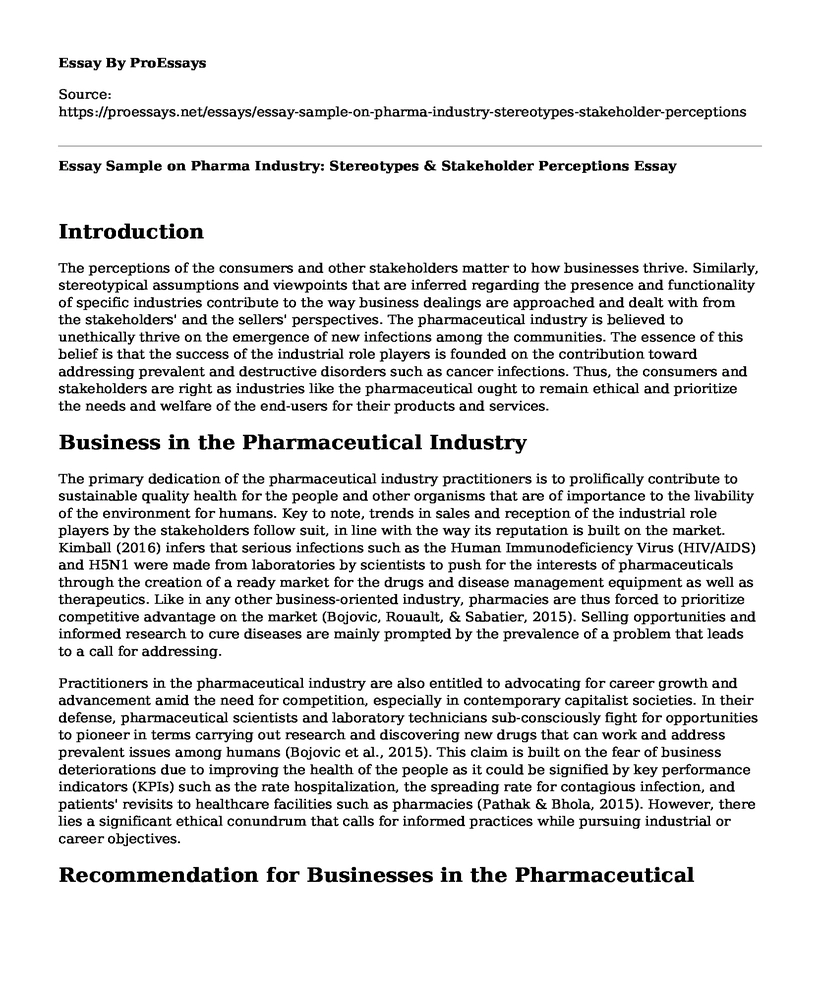Introduction
The perceptions of the consumers and other stakeholders matter to how businesses thrive. Similarly, stereotypical assumptions and viewpoints that are inferred regarding the presence and functionality of specific industries contribute to the way business dealings are approached and dealt with from the stakeholders' and the sellers' perspectives. The pharmaceutical industry is believed to unethically thrive on the emergence of new infections among the communities. The essence of this belief is that the success of the industrial role players is founded on the contribution toward addressing prevalent and destructive disorders such as cancer infections. Thus, the consumers and stakeholders are right as industries like the pharmaceutical ought to remain ethical and prioritize the needs and welfare of the end-users for their products and services.
Business in the Pharmaceutical Industry
The primary dedication of the pharmaceutical industry practitioners is to prolifically contribute to sustainable quality health for the people and other organisms that are of importance to the livability of the environment for humans. Key to note, trends in sales and reception of the industrial role players by the stakeholders follow suit, in line with the way its reputation is built on the market. Kimball (2016) infers that serious infections such as the Human Immunodeficiency Virus (HIV/AIDS) and H5N1 were made from laboratories by scientists to push for the interests of pharmaceuticals through the creation of a ready market for the drugs and disease management equipment as well as therapeutics. Like in any other business-oriented industry, pharmacies are thus forced to prioritize competitive advantage on the market (Bojovic, Rouault, & Sabatier, 2015). Selling opportunities and informed research to cure diseases are mainly prompted by the prevalence of a problem that leads to a call for addressing.
Practitioners in the pharmaceutical industry are also entitled to advocating for career growth and advancement amid the need for competition, especially in contemporary capitalist societies. In their defense, pharmaceutical scientists and laboratory technicians sub-consciously fight for opportunities to pioneer in terms carrying out research and discovering new drugs that can work and address prevalent issues among humans (Bojovic et al., 2015). This claim is built on the fear of business deteriorations due to improving the health of the people as it could be signified by key performance indicators (KPIs) such as the rate hospitalization, the spreading rate for contagious infection, and patients' revisits to healthcare facilities such as pharmacies (Pathak & Bhola, 2015). However, there lies a significant ethical conundrum that calls for informed practices while pursuing industrial or career objectives.
Recommendation for Businesses in the Pharmaceutical Industry
According to Berger and colleagues (2019), there is a need for a leveraged operational relationship between the public and medical and pharmaceutical industries. Such that, medical and pharmaceutical practitioners ought to work with the interests of the people at heart. Notably, the code of ethics for business requires managers and strategic formulators to focus on addressing the needs and requirements of the stakeholders through universally upheld core values such as integrity, transparency, and honesty in practices and business-related dealings (Berger et al., 2019). This recommendation is built on the fact that optimum performance leads to a sustainable equilibrium in business due to the satisfying relationship with key stakeholders such as the consumers of goods and services and other facilitators of the business (Pathak & Bhola, 2015).
Conclusion
Ethics in business contribute to the value of goodwill reputation that can be associated with the organization. At the industrial level, the pharmaceuticals are surrounded by stereotypical claims that businesses rejoice and partake in enhancing the emergence of new infections that guarantee a better business due to growth in the volumes of sales (Bojovic et al., 2015). Also, infections grant pharmaceutical practitioners opportunities to grow up the career ladder through novel contribution to health practices. Some diseases are also known to be lab-generated for the same reason. Businesses should prioritize ethical ways of dealing with leveraged business in favor of patients and the public at large (Pathak & Bhola, 2015). Optimally conducted business can easily grow and be sustained for long in favor of the investors and stakeholders owing to a mutual satisfaction between them.
References
Berger, K. M., Wood, J. L., Jenkins, B., Olsen, J., Morse, S. S., Gresham, L., & Moore, M. (2019). Policy and Science for Global Health Security: Shaping the Course of International Health. Tropical medicine and infectious disease, 4(2), 60. Retrieved from: https://www.mdpi.com/2414-6366/4/2/60/pdf
Bojovic, N., Rouault, S., & Sabatier, V. (2015). What can innovative business models be triggered by precision medicine? Analogical reasoning from the magazine industry. Innovation and Entrepreneurship in Health, 2, 81-94. Retrieved from: https://www.researchgate.net/profile/Stephane_Rouault/publication/282321707_What_innovative_business_models_can_be_triggered_by_precision_medicine_Analogical_reasoning_from_the_magazine_industry/links/5620f97608aed8dd19429dd3/What-innovative-business-models-can-be-triggered-by-precision-medicine-Analogical-reasoning-from-the-magazine-industry.pdf
Kimball, A. M. (2016). Risky trade: Infectious disease in the era of global trade. Abingdon-On-Thames: Routledge. Retrieved from: https://content.taylorfrancis.com/books/download?dac=C2015-0-87826-4&isbn=9781317062561&format=googlePreviewPdf
Pathak, G., & Bhola, S. S. (2015). Ways and means to establish CRM in a Pharmaceutical Company. International Journal of Research in Finance and Marketing (IJRFM) Volume, 5. Retrieved from: http://www.kbpimsr.ac.in/Docs/ResearchArticles/86%20Ways%20and%20means%20to%20establish%20CRM%20in%20pharmaceutical.pdf
Cite this page
Essay Sample on Pharma Industry: Stereotypes & Stakeholder Perceptions. (2023, Jan 31). Retrieved from https://proessays.net/essays/essay-sample-on-pharma-industry-stereotypes-stakeholder-perceptions
If you are the original author of this essay and no longer wish to have it published on the ProEssays website, please click below to request its removal:
- Targeting Isocitrate Lyase (ICL) For the Treatment of Talent Tuberculosis
- The Hurting Healthcare Cost Essay Example
- Essay Sample on Blue Cross Blue Shield of Massachusetts
- Examples of Three Presentations on Medicine and Healthcare
- Essay Sample on Importance of Medicinal Marijuana
- Essay Example on Stroke: Causes & Effects of Brain Cell Damage
- Nurses: Ethical Awareness Needed for Effective Healthcare Delivery - Essay Sample







